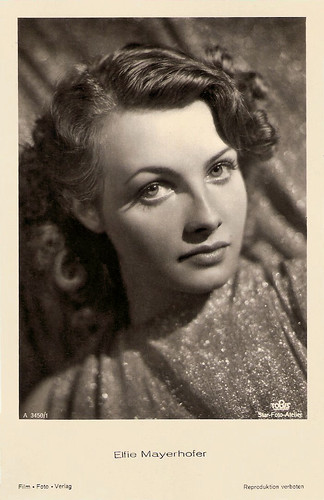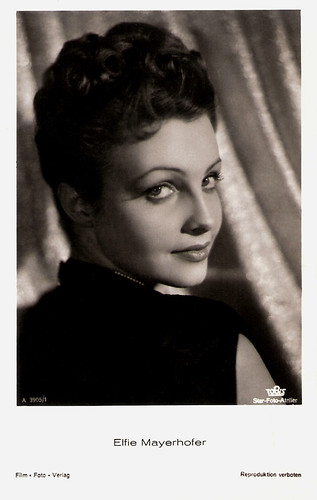Attractive Austrian actress and singer Elfie Mayerhofer (1917-1992) was nicknamed 'the Viennese Nightingale' by the press and the public. During her long career, she starred in nineteen European entertainment films, most of them with Viennese settings.

German postcard by Film-Foto-Verlag, no. G 99, 1941-1944. Photo: Star-Foto-Atelier / Tobis.

German postcard by Film-Foto-Verlag, no. A 3748/1, 1941-1944. Photo: Star-Foto-Atelier / Tobis.
Elfie Mayerhofer was born Elfie Lauterbach in Marburg an der Drau, Austria-Hungary (now Maribor, Slovenia) in 1917 (according to some sources in 1923). She was the daughter of an Austrian teacher. Even as a child she was interested in acting and singing, and participated in performances of fairy tales and church concerts. Her parents gave her singing and piano lessons and later she studied music in Zürich under Prof. Fred Husler and in Vienna.
In 1935 she was a student at the Berlin High School of Music under Prof. Lula Mysz-Gmeiner along with Elisabeth Schwarzkopf. Elfie made her acting debut at the Jugendtheater (Youth Theater) in München (Munich). She performed at the Staatsoper (State Opera) in Vienna, the Metropoltheater in Berlin and various other theatres in Austria and Berlin in the early 1930s.
Elfie Mayerhofer excelled as Pamina in Wolfgang Amadeus Mozart's 'Die Zauberflöte' (The Magic Flute), as Mimi in Giacomo Puccini's 'La bohème', as Violetta in Giuseppe Verdi's 'La Traviata', as well as Rosalinda in Johan Strauss II' 'Die Fledermaus' (The Bat). Her clear coloratura soprano voice was so unusual it earned her the nickname ‘The Viennese Nightingale’. The film industry became interested in her.
In 1938, she received her first major role in the German-made Western Frauen für Golden Hill / Women of Golden Hill (Erich Waschneck, 1938) starring Kirsten Heiberg. The following year she had a role in the Austrian film Hotel Sacher (Erich Engel, 1939) with Sybille Schmitz, where she sang a Yugoslavian gypsy folk song.
Hereafter followed again and again roles in such well-known musicals and operettas as Wir bitten zum Tanz / Invitation to the Dance (Hubert Marischka, 1941) with Hans Holt, and Meine Frau Teresa / My Wife, Teresa (Arthur Maria Rabenalt, 1942) opposite Hans Söhnker. Her leading role in Das Lied der Nachtigall / The Song of the Nightingale (Theo Lingen, 1944) winked at her nickname, the Viennese Nightingale.

German postcard by Film-Foto-Verlag, no. A 3450/1, 1941-1944. Photo: Star-Foto-Atelier/Tobis.

German postcard by Film-Foto-Verlag, no. A 3905/1, 1941-1944. Photo: Star-Foto-Atelier/Tobis.
After the war, Elfie Mayerhofer performed for Allied troops in Austria and Germany and sang at concerts and in operas. Herbert von Karajan wanted her in 1949 for the Salzburger Musikfestspiele (Salzburg Music Festival) in Austria, where she sang and played the role of Cherubino alongside Maria Cebotari in Wolfgang Amadeus Mozart’s 'Die Hochzeit des Figaro' (The Marriage of Figaro).
In 1949 she appeared in Paris, in the operetta 'La Reine des Valses' (The Queen of the Waltzes), playing opposite the Belgium tenor Henri Legay. She released records in France, Great Britain, Germany and the USA, but never in her home country.
After 1945, she also continued her successes in the cinema with popular entertainment films like Wiener Melodien / Viennese Melodies (Theo Lingen, Hubert Marischka, 1947) opposite Johannes Heesters, and Der Himmlische Walzer / The Heavenly Waltz (Géza von Cziffra, 1948) with Paul Hubschmid. In Anni (Max Neufeld, 1948), she sang with Siegfried Breuer and Josef Meinrad several well-known operetta melodies.
Her last Austrian film was Verlorene Melodien / Vanished Melodies (Eduard von Borsody, 1952) with Evelyn Künneke, and her last German film was Madame Pompadour (Gerhard Freund, 1960) with Heinz Bennent. Between 1957 and 1960 she also participated in early television programs. Her last TV film was the musical Die Landstreicher / The Tramps (Peter Dörre, 1968). In 1974, Elfie Mayerhofer (then sixty-plus) went on an extensive international tour, and sang and played successfully in operas and operettas in the United States, Mexico and Canada.
Elfie Mayerhofer received in the course of her career numerous awards, including the Goldene Ehrenzeichen des Landes Wien (Golden Medal of the Province of Vienna) and the Johann-Strauß-Statuette (Johann Strauss statue). She was married to the architect Thomas Lauterbach until their divorce in 1959. Maierhofer continued to give live performances in Austria almost up until her death. She died in 1992 in Maria Enzersdorf in Lower Austria.

German postcard by Film-Foto-Verlag, no. G 217, 1941-1944. Photo: Star-Foto-Atelier / Tobis.
Elfie Mayerhofer sings a Slovenian folk song in Hotel Sacher (1939). Source: Rudi Polt (YouTube).
Sources: Stephanie D’Heil (Steffi-line - German), Thomas Staedeli (Cyranos), Filmportal, Wikipedia (German) and IMDb.
This post was last updated on 5 July 2025.

German postcard by Film-Foto-Verlag, no. G 99, 1941-1944. Photo: Star-Foto-Atelier / Tobis.

German postcard by Film-Foto-Verlag, no. A 3748/1, 1941-1944. Photo: Star-Foto-Atelier / Tobis.
Clear Coloratura Soprano
Elfie Mayerhofer was born Elfie Lauterbach in Marburg an der Drau, Austria-Hungary (now Maribor, Slovenia) in 1917 (according to some sources in 1923). She was the daughter of an Austrian teacher. Even as a child she was interested in acting and singing, and participated in performances of fairy tales and church concerts. Her parents gave her singing and piano lessons and later she studied music in Zürich under Prof. Fred Husler and in Vienna.
In 1935 she was a student at the Berlin High School of Music under Prof. Lula Mysz-Gmeiner along with Elisabeth Schwarzkopf. Elfie made her acting debut at the Jugendtheater (Youth Theater) in München (Munich). She performed at the Staatsoper (State Opera) in Vienna, the Metropoltheater in Berlin and various other theatres in Austria and Berlin in the early 1930s.
Elfie Mayerhofer excelled as Pamina in Wolfgang Amadeus Mozart's 'Die Zauberflöte' (The Magic Flute), as Mimi in Giacomo Puccini's 'La bohème', as Violetta in Giuseppe Verdi's 'La Traviata', as well as Rosalinda in Johan Strauss II' 'Die Fledermaus' (The Bat). Her clear coloratura soprano voice was so unusual it earned her the nickname ‘The Viennese Nightingale’. The film industry became interested in her.
In 1938, she received her first major role in the German-made Western Frauen für Golden Hill / Women of Golden Hill (Erich Waschneck, 1938) starring Kirsten Heiberg. The following year she had a role in the Austrian film Hotel Sacher (Erich Engel, 1939) with Sybille Schmitz, where she sang a Yugoslavian gypsy folk song.
Hereafter followed again and again roles in such well-known musicals and operettas as Wir bitten zum Tanz / Invitation to the Dance (Hubert Marischka, 1941) with Hans Holt, and Meine Frau Teresa / My Wife, Teresa (Arthur Maria Rabenalt, 1942) opposite Hans Söhnker. Her leading role in Das Lied der Nachtigall / The Song of the Nightingale (Theo Lingen, 1944) winked at her nickname, the Viennese Nightingale.

German postcard by Film-Foto-Verlag, no. A 3450/1, 1941-1944. Photo: Star-Foto-Atelier/Tobis.

German postcard by Film-Foto-Verlag, no. A 3905/1, 1941-1944. Photo: Star-Foto-Atelier/Tobis.
The Queen of the Waltzes
After the war, Elfie Mayerhofer performed for Allied troops in Austria and Germany and sang at concerts and in operas. Herbert von Karajan wanted her in 1949 for the Salzburger Musikfestspiele (Salzburg Music Festival) in Austria, where she sang and played the role of Cherubino alongside Maria Cebotari in Wolfgang Amadeus Mozart’s 'Die Hochzeit des Figaro' (The Marriage of Figaro).
In 1949 she appeared in Paris, in the operetta 'La Reine des Valses' (The Queen of the Waltzes), playing opposite the Belgium tenor Henri Legay. She released records in France, Great Britain, Germany and the USA, but never in her home country.
After 1945, she also continued her successes in the cinema with popular entertainment films like Wiener Melodien / Viennese Melodies (Theo Lingen, Hubert Marischka, 1947) opposite Johannes Heesters, and Der Himmlische Walzer / The Heavenly Waltz (Géza von Cziffra, 1948) with Paul Hubschmid. In Anni (Max Neufeld, 1948), she sang with Siegfried Breuer and Josef Meinrad several well-known operetta melodies.
Her last Austrian film was Verlorene Melodien / Vanished Melodies (Eduard von Borsody, 1952) with Evelyn Künneke, and her last German film was Madame Pompadour (Gerhard Freund, 1960) with Heinz Bennent. Between 1957 and 1960 she also participated in early television programs. Her last TV film was the musical Die Landstreicher / The Tramps (Peter Dörre, 1968). In 1974, Elfie Mayerhofer (then sixty-plus) went on an extensive international tour, and sang and played successfully in operas and operettas in the United States, Mexico and Canada.
Elfie Mayerhofer received in the course of her career numerous awards, including the Goldene Ehrenzeichen des Landes Wien (Golden Medal of the Province of Vienna) and the Johann-Strauß-Statuette (Johann Strauss statue). She was married to the architect Thomas Lauterbach until their divorce in 1959. Maierhofer continued to give live performances in Austria almost up until her death. She died in 1992 in Maria Enzersdorf in Lower Austria.

German postcard by Film-Foto-Verlag, no. G 217, 1941-1944. Photo: Star-Foto-Atelier / Tobis.
Elfie Mayerhofer sings a Slovenian folk song in Hotel Sacher (1939). Source: Rudi Polt (YouTube).
Sources: Stephanie D’Heil (Steffi-line - German), Thomas Staedeli (Cyranos), Filmportal, Wikipedia (German) and IMDb.
This post was last updated on 5 July 2025.
No comments:
Post a Comment